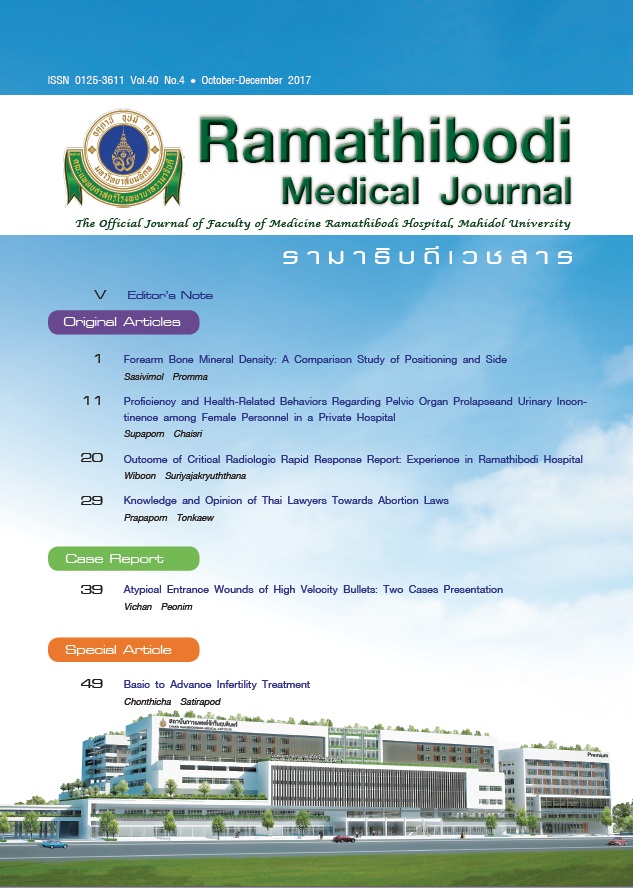Forearm Bone Mineral Density: A Comparison Study of Positioning and Side
Keywords:
DXA, Forearm, Positioning, Supine, SitAbstract
Background: The scanning position for measure forearm bone mineral density (BMD) is recommended by the International Society for Clinical Densitometry (ISCD) to scan at the non-dominant forearm in the sitting position. However, this position may be uncomfortable for the patients. Especially for those who are elder or cannot easily move. Pragmatically, the supine position is more comfortable than the sitting position for patients to measure forearm BMD.
Objective: The purpose of this study was to estimate the difference of forearm BMD between the standard sitting and supine position as well as between the non-dominant and the dominant side.
Methods: One hundred and fifty two female patients who gave written informed consent underwent 3 acquisitions of dual X-ray absorptiometry (DXA) altogether: 2 on the non-dominant forearm--one in the sitting and the other in the supine position; 1 on the dominant forearm in the sitting position.
Results: All patients were right forearm dominant. The 33% radius BMD difference between the sitting and supine position was -0.005 g/cm2 (95% CI, -0.03 to 0.02) while that between the dominant and non-dominant side was -0.011 g/cm2 (95% CI, -0.06 to 0.04). When classified by World Health Organization (WHO) classification into 3 groups as normal, low bone mass, and osteoporosis, the agreement between the sitting and supine position of the non-dominant at this site was perfect (Kappa = 0.85) while that between the dominant and non-dominant side in the sitting position was moderate (Kappa = 0.64).
Conclusions: Measurement of BMD by DXA at non-dominant forearm in the sitting position can be scanned in the supine position without a change in diagnosis. Then the dominant forearm can be used instead the non-dominant if the non-dominant forearm is not properly done due to the presence of historical fracture or congenital deformities.
References
Zhao J, Xing Y, Zhou Q, Jin W, Wacker W, Barden HS. Can forearm bone mineral density be measured with DXA in the supine position? A study in Chinese population. J Clin Densitom. 2010;13(2):147-50. doi:10.1016/j.jocd.2010.02. 001.
Chang YJ, Yu W, Lin Q, Yao JP, Zhou XH, Tian JP. Forearm bone mineral density measurement with different scanning positions: a study in right-handed Chinese using dual-energy X-ray absorptiometry. J Clin Densitom. 2012;15 (1):67-71. doi:10.1016/j.jocd.2011.08.005.
Lekamwasam S, Rodrigo M, de Silva KI, Munidasa D. Comparison of phalangeal bone mineral content and density between the dominant and non-dominant sides. Ceylon Med J. 2005;50(4):149-51.
The International Society for Clinical Densitometry. ISCD Official positions, 2007. https://www.iscd.org/official-positions/official-positions/. Published October, 2007. Updated December 27, 2012. Accessed February 8, 2017.
Bonnick SL. Bone Densitometry in Clinical Practice: Application and Interpretation. 3rd ed. New York, NY: Humana Press; 2009. doi:10.1007/978-1-60327-499-9.
Musikarat S. The least meaningful change of BMD: The reproducibility. Mahidol University; 2006.
Amnuaywattakorn S, Sritra C, Thamnirat K. Cross calibration of bone mineral density values among three dual energy X-ray absorptiometry systems. Ramathibodi Medical Journal. 2012;35:114-21.
Downloads
Published
How to Cite
Issue
Section
License
Copyright (c) 2017 By the authors. Licensee RMJ, Faculty of Medicine Ramathibodi Hospital, Mahidol University, Bangkok, Thailand

This work is licensed under a Creative Commons Attribution-NonCommercial-NoDerivatives 4.0 International License.













